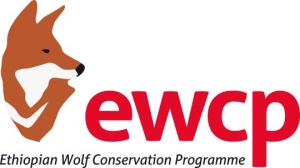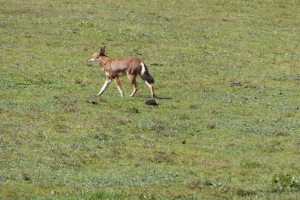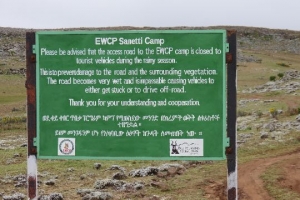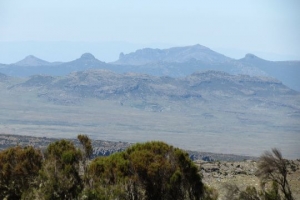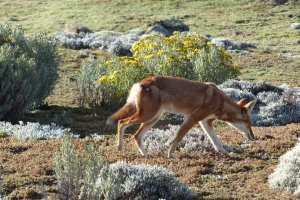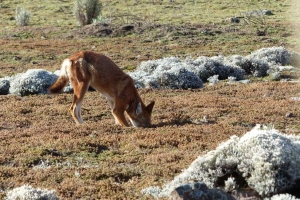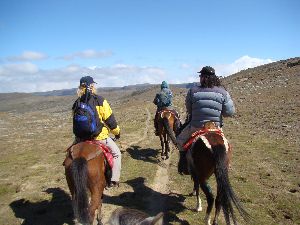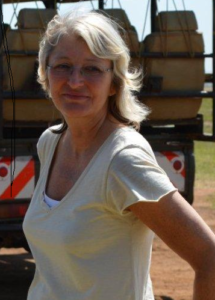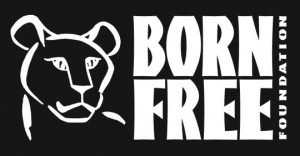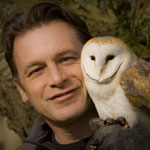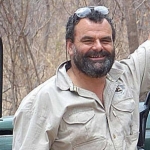Wolf Conservation Fund-raising Expedition, Ethiopia
An exclusive wolf conservation safari that financially supports the Ethiopian Wolf Conservation Programme
- Guided by wolf expert Prof Claudio Sillero DPhil (Oxon) or Field Director Eric Bedin
- See critically endangered Ethiopian wolves in the wild
- Observe wolves up close on foot, on horseback and in 4×4’s
- Explore the breathtakingly beautiful Bale Mountains
- Intimate group of 2-4 wolf watchers
- Includes a financial donation to help support the long term survival of the Ethiopian wolves
Wolf Conservation Fund-raising Expedition, Ethiopia
To make an enquiry please call orcomplete our enquiry form
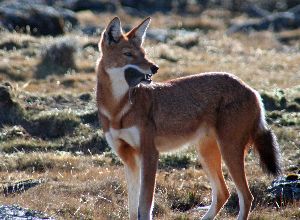 Ethiopian wolves are the rarest African carnivore, and the only wolf in Africa. Fewer than 400 wolves remain in a handful of mountain enclaves, and more than half are found in the Bale Mountains. This is the best place to see wolves in Ethiopia. The Bale Mountains are the ‘Roof of Africa’ – with a 1,000km2 of Afroalpine meadows and Erica moorlands this is the largest mountain plateau in the continent. The wolves are the guardians of these magical lands whihc are still only visited by a handful of lupine enthusiasts.
Ethiopian wolves are the rarest African carnivore, and the only wolf in Africa. Fewer than 400 wolves remain in a handful of mountain enclaves, and more than half are found in the Bale Mountains. This is the best place to see wolves in Ethiopia. The Bale Mountains are the ‘Roof of Africa’ – with a 1,000km2 of Afroalpine meadows and Erica moorlands this is the largest mountain plateau in the continent. The wolves are the guardians of these magical lands whihc are still only visited by a handful of lupine enthusiasts.
Trip details – example only
Day 1 Arrive in Addis Ababa – hotel
Arrive in the Ethiopian capital and meet your fellow wolf watchers. Overnight in Addis Ababa 2,400m.
Day 2 Sanetti Plateau and Harenna Forest – lodge
Fly from Addis Ababa to Gobe. Meet our drivers and 4×4 vehicles.
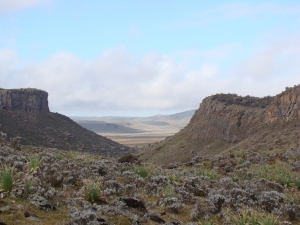 Continue south to the EWCP Sanetti research hut 4,050m in the Bale Mountains National Park . Meet members of the EWCP team and wolf monitors. After lunch spend the afternoon wolf watching from the vehicles and on foot before descending to the lodge in the Harenna Forest for the night. At the southern end of the Sanetti Plateau the Harenna Escarpment descends to a forest almost 2000m below. The forest is far denser than the juniper woodland around Dinsho and is excellent for bird watching and for seeing olive baboons, black and white colobus, Menelik’s bushbuck, warthog, bush pig, and hopefully Bale Monkeys, giant forest hog and even leopard and lion. Nocturnal mammals include genet, civet, porcupine and hyena. The bamboo forests are full of birds including the grey cuckoo shrike, Abyssinian catbird, Ruppell’s robin chat, Abyssinian ground thrush, white-cheeked turaco and many more species. The contrast from the high plateau in such a short distance is extraordinary and will help you acclimatise.
Continue south to the EWCP Sanetti research hut 4,050m in the Bale Mountains National Park . Meet members of the EWCP team and wolf monitors. After lunch spend the afternoon wolf watching from the vehicles and on foot before descending to the lodge in the Harenna Forest for the night. At the southern end of the Sanetti Plateau the Harenna Escarpment descends to a forest almost 2000m below. The forest is far denser than the juniper woodland around Dinsho and is excellent for bird watching and for seeing olive baboons, black and white colobus, Menelik’s bushbuck, warthog, bush pig, and hopefully Bale Monkeys, giant forest hog and even leopard and lion. Nocturnal mammals include genet, civet, porcupine and hyena. The bamboo forests are full of birds including the grey cuckoo shrike, Abyssinian catbird, Ruppell’s robin chat, Abyssinian ground thrush, white-cheeked turaco and many more species. The contrast from the high plateau in such a short distance is extraordinary and will help you acclimatise.
Days 3 & 4 Sanetti Plateau – camp site alongside the EWCP hut
Sanetti Plateau is austere lunar-like landscape with lakes and mountain peaks. It has a wild beauty and offers stunning panoramic views. Tulu Deemti (4,377m) is Ethiopian’s second highest peak, which can be reached by a track. Here you really do feel you are on the roof of Africa.
Wolf Watching on the Sanetti Plateau in 4×4’s and on foot.
The wolves on the Sanetti Plateau are very used to vehicles so you can get close to them from your car. On foot you can get closer to dens (maintaining a respectful distance) and quietly observe wolf behaviour.
Days 5 & 6 Pony trek traverse of the Bale Mountains – wild camping
Ethiopian ponies are sturdy mountain stock, which makes it possible for people with limited riding experience to traverse the Bale Mountains on horseback (there are no roads and few trails). This is a unique wilderness experience with the opportunity to see more wolves and appreciate their fragile environment and the sheer beauty of the Bale Mountains. Each day you will be riding at a walking pace for 6 – 8 hours. There are a few sections of rocky terrain where you will have to lead your pony across on foot. All food, tents and personal equipment are carried by pack-horses. A primitive camp is set up each night and hot meals are prepared for you by an accompanying cook.
Days 7 & 8 Web Valley – camp site alongside the EWCP hut
The pony trek and traverse of the Bale Mountains culminates in the beautiful Web Valley 3,450m at a camp adjacent to the EWCP research hut.
Wolf watching in the Web Valley on foot, horseback and in 4×4’s
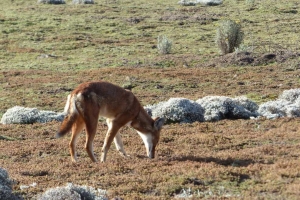 The Web Valley (3450m) is exceptionally beautiful and remote. The wolves in the Web Valley have much less human and vehicular contact so travelling on horseback and foot is the best method. The riding ponies are sturdy local breeds and the journey is taken at a walking pace only. No previous riding experience is needed but a sense of adventure and a good level of fitness is essential. With just 4 – 7 people in our party you will be able to get close to the wolves without unsettling them. Whilst the focus will be on finding wolves and locating dens, other species to enjoy include mountain nyala, Menelik’s bushbuck, rock hyrax, klipspringer and giant mole rat.
The Web Valley (3450m) is exceptionally beautiful and remote. The wolves in the Web Valley have much less human and vehicular contact so travelling on horseback and foot is the best method. The riding ponies are sturdy local breeds and the journey is taken at a walking pace only. No previous riding experience is needed but a sense of adventure and a good level of fitness is essential. With just 4 – 7 people in our party you will be able to get close to the wolves without unsettling them. Whilst the focus will be on finding wolves and locating dens, other species to enjoy include mountain nyala, Menelik’s bushbuck, rock hyrax, klipspringer and giant mole rat.
At least 16 endemic bird species have been recorded in the park includingblue-winged goose, wattled ibis, spot-throated plover, ruddy shelduck, Auger buzzard, lanner falcon, kestrel, tawny, steppe, black and golden eagles, Lammergeyer and Abyssinain long-eared owls.
Day 9 Lake Langano – lodge
Before departing the Bale Mountains we’ll visit the EWCP HQ in Dinsho, where you’ll meet other members of the team and see their exhibits and how they collate the data. After lunch drive back towards Addis Ababa stopping for a final evening in the lake district in the Rift Valley 1,500m.
Day 10 Addis Ababa and onward travel arrangements
Time to relax and enjoy the bird life around the lake. Over 300 bird species have been recorded here including great white pelicans, cormorants, darters, storks, kingfishers, Egyptian geese, fish eagles, starlings, hornbills, weavers, bustards and many more. After lunch return to Addis for onward flights or further adventures in Ethiopia.
(Anyone not wishing to ride ponies and traverse the Bale Mountains can return to the lodge for a further two nights before driving to the Web Valley and continuing with the wolf watching programme – supplementary cost will apply).
Notes
Claudio Sillero or Eric Bedin (Field Director) and a travel escort will be with you throughout. Additionally, members of the EWCP team will accompany you in the Bale Mountains.
The best time of year to undertake this expedition is in November or February.
Guideline price per person excluding international flights: £7,495 / US$9,750
Single supplement: £ 200 / US$ 260
Number of participants: 2 – 4
As well as a significant donation to EWCP, most of the costs support the local team in Ethiopia.
For guests from the US payment can be made in US dollars at the appropriate exchange rate.
Optional extra nights at the lodge in the Bale Mountains and extension trips to see the rock-hewn churches at Lalibela and to the Simien Mountains can be arranged.
Wolf Conservation Fund-raising Expedition, Ethiopia
To make an enquiry please call orcomplete our enquiry form
Trip Host – Claudio Sillero
 Claudio’s resolve and energy is the driving force behind the research and conservation of the Ethiopian wolf. He works relentlessly to help the long term survival of this endangered species – raising the finances to run the programme, spreading the awareness about the wolves and working with the Ethiopian Government to ensure its sustainability. Claudio is also Head of Conservation at the Born Free Foundation and holds the post of Bill Travers Fellow for Wildlife Conservation at the University of Oxford. Claudio is the Chair of the IUCN Canid Specialist Group. He supervises other conservation projects worldwide, including the Satpura Landscape Tiger Programme in central India and the Transfrontier Conservation of Andean Cats project in South America. Claudio is a passionate conservation biologist actively committed to mitigating wildlife-human conflict through hands-on initiatives – the Ethiopian Wolf Conservation Programme is a prime example of this.
Claudio’s resolve and energy is the driving force behind the research and conservation of the Ethiopian wolf. He works relentlessly to help the long term survival of this endangered species – raising the finances to run the programme, spreading the awareness about the wolves and working with the Ethiopian Government to ensure its sustainability. Claudio is also Head of Conservation at the Born Free Foundation and holds the post of Bill Travers Fellow for Wildlife Conservation at the University of Oxford. Claudio is the Chair of the IUCN Canid Specialist Group. He supervises other conservation projects worldwide, including the Satpura Landscape Tiger Programme in central India and the Transfrontier Conservation of Andean Cats project in South America. Claudio is a passionate conservation biologist actively committed to mitigating wildlife-human conflict through hands-on initiatives – the Ethiopian Wolf Conservation Programme is a prime example of this.
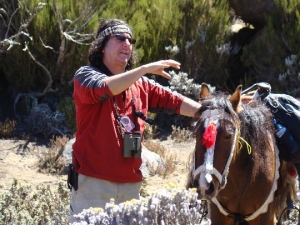 Claudio is a dynamic and hands-on conservation biologist actively committed to mitigating wildlife-human conflict. He is an engaging and informative host. His enthusiasm and passion for the Ethiopian wolf is infectious and awe-inspiring. What Claudio has achieved and his dedication and hard work in helping the long-term survival of the species is truly commendable. He is a unique individual and it is a real privilege to travel with him.
Claudio is a dynamic and hands-on conservation biologist actively committed to mitigating wildlife-human conflict. He is an engaging and informative host. His enthusiasm and passion for the Ethiopian wolf is infectious and awe-inspiring. What Claudio has achieved and his dedication and hard work in helping the long-term survival of the species is truly commendable. He is a unique individual and it is a real privilege to travel with him.
Trip Host – Eric Bedin
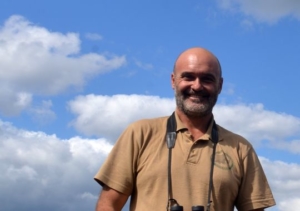 Eric has been the Field Director in the Bale Mountains for the Ethiopian Wolf Conservation Programme since 2014. He has a BSc in Biology from the University of Toulouse in France and a diploma of Engineer in Agriculture-Livestock production from the National School of Agricultural Techniques of Bordeaux. 1996-2004 he was the NWRC Mammal Curator and Field Biologist on the Arabian oryx reintroduction programme in Saudi Arabia in Taif and in ‘Uruq Bani Ma’Arid (The Empty Quarter). In 2009 he became the Technical Adviser of the Gilé National Reserve in Mozambique’s Zambezian province, focusing on infrastructure rehabilitation, law enforcement and biodiversity monitoring and development.
Eric has been the Field Director in the Bale Mountains for the Ethiopian Wolf Conservation Programme since 2014. He has a BSc in Biology from the University of Toulouse in France and a diploma of Engineer in Agriculture-Livestock production from the National School of Agricultural Techniques of Bordeaux. 1996-2004 he was the NWRC Mammal Curator and Field Biologist on the Arabian oryx reintroduction programme in Saudi Arabia in Taif and in ‘Uruq Bani Ma’Arid (The Empty Quarter). In 2009 he became the Technical Adviser of the Gilé National Reserve in Mozambique’s Zambezian province, focusing on infrastructure rehabilitation, law enforcement and biodiversity monitoring and development.
Trip organization – Liz Drake
This trip is organised and coordinated by Liz Drake from Spencer Scott Travel. She will travel with you as your escort, taking personal care of you and helping to make sure you are as comfortable as possible. She will be supported by the camp staff and EWCP team. She and Prof Claudio Sillero have worked together since 2004 on special wildlife trip to India, Brazil and Ethiopia.
Camping details – we operate with the minimum impact on the environment so keep things as small scale as feasible and only use sustainable firewood and local food
- Camps are located alongside EWCP’s research huts
- We travel with a local cook and cook assistant. Meals are freshly prepared in camp and served inside the research huts next to the wood-burner
- High quality modern expedition double and single tents
- Sleeping mattresses included
- Mobile eco-toilets on sharing basis
- Bucket shower with hot water
- We travel with 4×4’s and have them as a back-up for the duration of the trip
- We use packhorses to carry all your personal and camp equipment when doing the traverse trek.
Personal equipment required
- Waterproof Goretex trousers and jacket
- Down jacket
- 4-season sleeping bag
- Lightweight Goretex hiking boots
EWCP’s sponsors include:

Eco-tourism at its best
This is a special fund-raising safari for the Ethiopian Wolf Conservation Programme. Your participation will financially support the sustainable conservation of Ethiopian wolves. It is also the only wolf watching trip that is hosted by EWCP’s Director Prof Claudio Sillero.
Wolf Encounters
Prof. Claudio Sillero will share with you many of the secrets of the remote and wild Ethiopian Highlands. He will take you to den sites rarely visited by anyone other than himself and his wolf monitors. He will explain the unique social behaviour of the Ethiopian wolf and the data on the various packs in the Bale Mountains. Prof Claudio Sillero will also talk about the challenges EWCP faces and the on-going work needed to be done.
Wolf Watching at its best
We shall have 4×4 vehicles with us throughout, but to reach remote dens and to observe wolves foraging and social behaviour at a time when many packs will be looking after their pups, it is best to head out on foot or on horseback. Previous riding experience is not necessary as we use sturdy and sure-footed mountain ponies. We will be driving to both wolf watching locations in the Bale Mountains but there is an option to traverse the Bale Mountains on horseback for those wishing a wilderness adventure.
The Ethiopian Wolf Conservation Programme protects Ethiopian wolves and their Afro-alpine habitats. It’s Director is Prof. Claudio Sillero – a leading conservation biologist.
For more information on Ethiopian Wolf Conservation:
http://www.ethiopianwolf.org
http://wildlifeconservationnetwork.org/wildlife/ethiopianwolf.html
http://www.canids.org/wolfsg.htm
The Bale Mountains (2,500 – 4,377m)
Thr Bale Mountain range is spectacular, wild and varied with lava flows, dramatic granite outcrops, Afroalpine moorlands, Afro-montane forests, escarpments and high alpine plateau. The Bale Mountains are the largest mountain plateau in Africa (“the roof of Africa”). It is a vast wilderness area with no tracks and a pristine but fragile environment. Only a few Oromo families can be found living in isolation up on the plateau. The Bale Mountains are best visited during the dry season from November – February when the days are normally clear and warm and nights can be frosty. On the Sanetti Plateau sleet and snow is possible. Temperature will fall with increasing altitude and at night and could vary between +26C and –15C. At this time of year the Helichrysum, everlasting flowers of the Afroalpine area and the Hagenia and Hypericum trees are in flower, the wolves have their pups and so there is usually lots of wolf social behaviour to observe around the dens.
List of Endemic Species in the Bale Mountains
| Mammals species include: | Endemic birds include: |
| Mountain Nyala Starck’s Hare Ethiopian wolf Bale monkey Giant Molerat Lovat’s mouse Nikolaus’ mouse Mahomet’s mouse White-footed rat White-tailed rat Grey-tailed rat Blick’s grass rat Shrews Bats |
Wattled ibis Blue-winged goose Rouget’s Rail Spot-breasted plover White-collared pigeon Yellow-fronted parrot Black-winged lovebirds Banded barbet Golden-backed woodpecker Abyssinian longclaw White-winged cliff-chat Abyssinian catbird White-backed black tit Black-headed forest oriole Thick-billed raven Black-headed siskin |
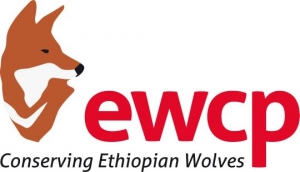
Images courtesy of A L Harrington, Nancy Gibson, Prof. Claudio Sillero, Oxford University, Eric Bedin & Liz Drake.
Wolf Conservation Fund-raising Expedition, Ethiopia
To make an enquiry please call orcomplete our enquiry form


